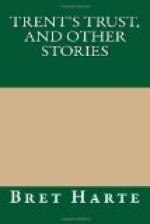“Joy of the desolate,
Light of the straying,
Hope of
the penitent—fadeless and pure;
Here speaks the Comforter,
tenderly saying,
Earth has
no sorrow that Heaven cannot cure!”
The hymn was old and familiar enough, Heaven knows. It had been quite popular at funerals, and some who sat there had had its strange melancholy borne upon them in time of loss and tribulations, but never had they felt its full power before. Accustomed as they were to emotional appeal and to respond to it, as the singer’s voice died away above them, their very tears flowed and fell with that voice. A few sobbed aloud, and then a voice asked tremulously,—
“Who is it?”
“It’s Mr. Hamlin,” said Seth quietly. “I’ve heard him often hummin’ things before.”
There was another silence, and the voice of Deacon Stubbs broke in harshly,—
“It’s rank blasphemy.”
“If it’s rank blasphemy to sing the praise o’ God, not only better than some folks in the choir, but like an angel o’ light, I wish you’d do a little o’ that blaspheming on Sundays, Mr. Stubbs.”
The speaker was Mrs. Stubbs, and as Deacon Stubbs was a notoriously bad singer the shot told.
“If he’s sincere, why does he stand aloof? Why does he not join us?” asked the parson.
“He hasn’t been asked,” said Seth quietly. “If I ain’t mistaken this yer gathering this evening was specially to see how to get rid of him.”
There was a quick murmur of protest at this. The parson exchanged glances with the deacon and saw that they were hopelessly in the minority.
“I will ask him myself,” said Mrs. Rivers suddenly.
“So do, Sister Rivers; so do,” was the unmistakable response.
Mrs. Rivers left the room and returned in a few moments with a handsome young man, pale, elegant, composed, even to a grave indifference. What his eyes might have said was another thing; the long lashes were scarcely raised.
“I don’t mind playing a little,” he said quietly to Mrs. Rivers, as if continuing a conversation, “but you’ll have to let me trust my memory.”
“Then you—er—play the harmonium?” said the parson, with an attempt at formal courtesy.
“I was for a year or two the organist in the choir of Dr. Todd’s church at Sacramento,” returned Mr. Hamlin quietly.
The blank amazement on the faces of Deacons Stubbs and Turner and the parson was followed by wreathed smiles from the other auditors and especially from the ladies. Mr. Hamlin sat down to the instrument, and in another moment took possession of it as it had never been held before. He played from memory as he had implied, but it was the memory of a musician. He began with one or two familiar anthems, in which they all joined. A fragment of a mass and a Latin chant followed. An “Ave Maria” from an opera was his first secular departure, but his delighted audience did not detect it. Then he hurried them along in unfamiliar language to “O mio Fernando” and “Spiritu gentil,” which they fondly imagined were hymns, until, with crowning audacity, after a few preliminary chords of the “Miserere,” he landed them broken-hearted in the Trovatore’s donjon tower with “Non te scordar de mi.”




